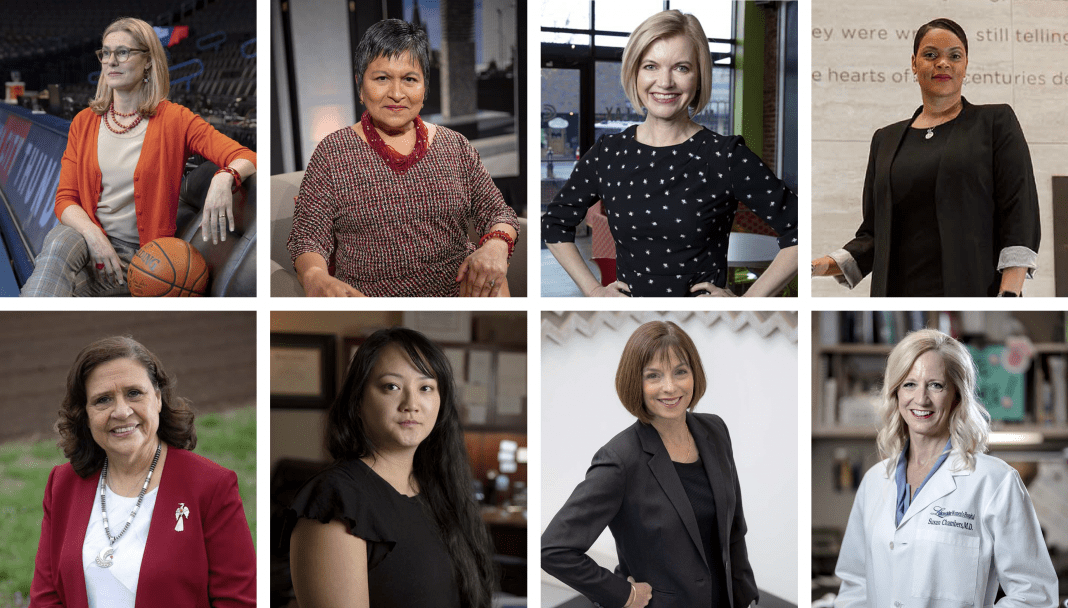Women are shaping Oklahoma’s future. We highlight a handful of the thousands of female leaders vying for change and fighting to make the state – and the world – a better place to live and work. From a philanthropic doctor and a nationally recognized banker to a tribal chief and a civil-rights lawyer, these women are the state’s brave pioneers.
8. Keeping Libraries Relevant
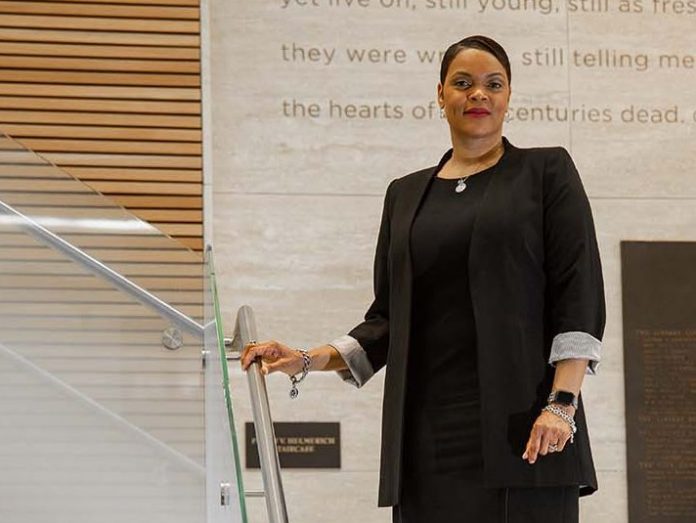
Kimberly Johnson
CEO, Tulsa City-County Library
As leader of one of the United States’ best programs in the field, Kim Johnson intends to keep the Tulsa City-County Library stellar, relevant and rocking that “cool factor.”
Johnson has had a great start since beginning her tenure in 2017 by opening the nation’s only public library Starbucks coffee shop in downtown’s renovated, $55 million Central Library.
After nearly 21 years working for the library system, most notably as its first coordinator of the African-American Resource Center, Johnson is the first African-American to hold the top job. Since arriving in Tulsa from Bronx, New York, Johnson started the library’s annual public tour of Oklahoma’s historic all-black towns and the first countywide reading initiative, Tulsa Metro Reads, nationally televised on C-SPAN/Book TV.
“We’re considered one of the best library systems in the country because of continuing hard work,” Johnson says. “It’s a very intentional vision to be a 21st-century library by removing barriers to service and providing convenience. Libraries around the country are working to remain relevant, which we do by listening and being nimble in our responses.
“In this day and age, if you don’t innovate and remain relevant, people go elsewhere. So … we’ll be looking at all of our locations, reviewing services and expanding where it makes sense, like with a children’s satellite library to debut soon at the Gathering Place. We’ve also started curbside delivery of materials at some locations … and that shows you how we’ll keep showing up in places you don’t expect us to be.”
7. Bring the Thunder
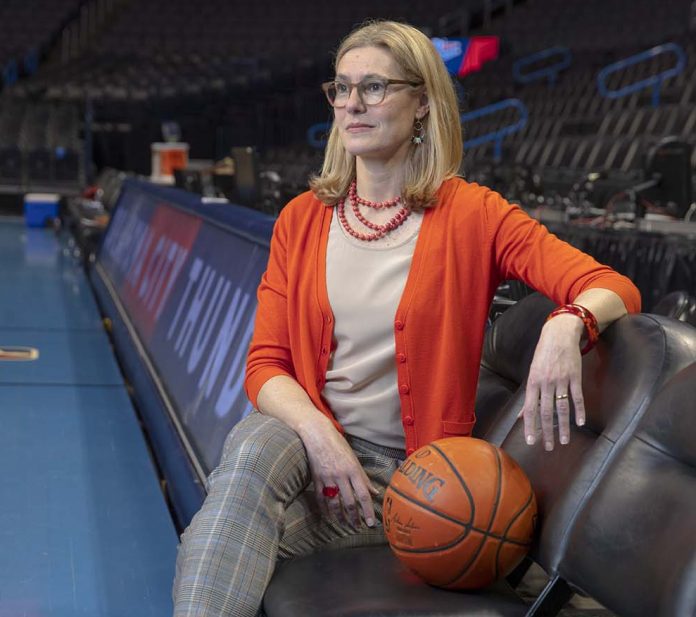
Christine Berney
Vice president of community relations, Oklahoma City Thunder; executive director, Thunder Cares Foundation
As a public and community relations professional, Christine Berney spent years with the Greater Oklahoma City Chamber of Commerce and Sonic Corp. before joining the Thunder during its move from Seattle in 2008.
“If you had told me 11 years ago that I’d be working for an NBA team today, I would have said you were crazy,” Berney says. “I had zero background in sports. What I discovered is that this job isn’t about three-point shots or pick-and-rolls; the Thunder organization is committed to being a meaningful part of the community, and I’m grateful to be part of that.”
Berney spearheads and manages ongoing and annual programs. This includes the Thunder Reading challenge, which invites thousands of Oklahoma students each year to develop good reading habits; the Black Heritage Creative Contest, which asks children from kindergarten through 12th grade to use creative outlets to honor outstanding individuals in black history or African-Americans who have influenced their own lives; and the Thunder StatLab, which offers middle schoolers the chance to act as a “junior GM” of the Thunder by learning the critical role of statistics in sports.
Berney is also the executive director of the Thunder Cares Foundation, which, among other projects, rebuilds and refurbishes basketball courts across the state. Berney says this position is definitely the most challenging she’s had during her career but also the most rewarding.
“I’ve experienced nothing but enthusiastic support from my colleagues and the leadership at both the Thunder and the NBA,” she says.
You can often find Berney on the court during home games making presentations with Rumble the Bison, who, she says, continually finds ways to embarrass her.
6. Opening Pathways to Success
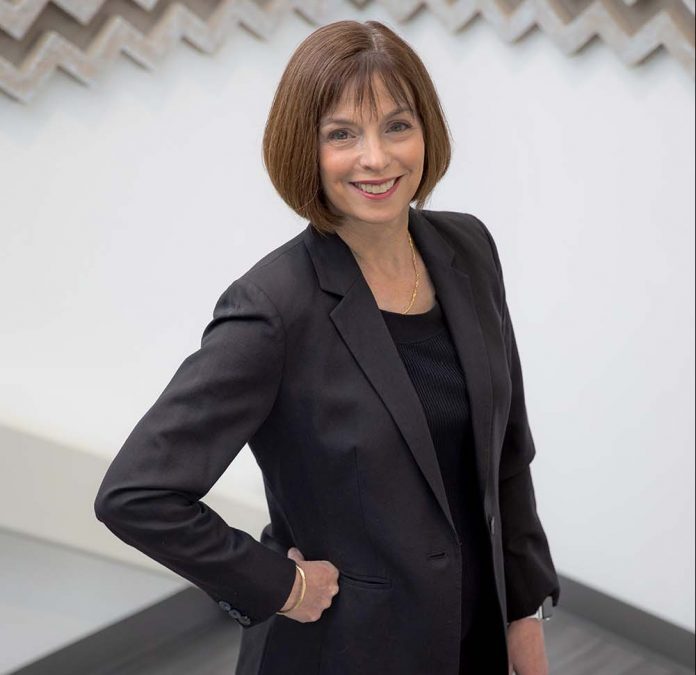
Leigh Goodson
President/CEO,
Tulsa Community College
Everything – from career and family to one’s network of friends – can positively impact others. This is the ideal that Leigh Goodson embodies in her passion to open pathways to success at TCC.
Under Goodson’s leadership since 2014, TCC has increased graduation and university transfer rates. This evolution is fueled in part by the school’s designation as one of 30 community colleges involved in a national initiative, the Pathways Project. This program aims to optimize enrollment and advising services; increase retention rates overall and specifically for minority, under-represented and full-time students; and speed up the process of developmental education students getting into college-level classes.
“We are creating clearer paths for students to get through college successfully and enter the workforce and earn a family sustaining wage,” Goodson says. “What a person creates as an individual is also accomplished collectively through relationships in our networks, and these relationships can help with the greater good.”
Goodson constantly looks to improve the lives of TCC students. Early in her tenure, she wondered what could be done to increase the number of students successfully transferring to four-year schools since those students, on average, lose 13 credit hours in the transition, according to the U.S. Government Accountability Office. Goodson brought this concern to Michael DuPont, program officer for the Charles and Lynn Schusterman Family Foundation.
By October 2018, the foundation began sponsoring the Tulsa Transfer Program, a first-of-its-kind collaborative effort with the John N. Gardner Institute for Excellence in Undergraduate Education, to help students retain credits and transfer into bachelor’s degree programs at four-year colleges.
Goodson’s other accomplishments include multiple projects in support of students in science, technology, engineering and math to “make sure we have a diverse workforce and are training people from all parts of the community,” she says.
5. A Mother’s Legacy

Tina Peña
Associate professor, Tulsa Community College;
host, Temas en Tulsa; president, Mita’s Foundation
Tina Peña, an associate professor of Spanish at TCC and coordinator of its Spanish-interpreting skills program, hosts a local current-events TV program, broadcast in Spanish, called Temas en Tulsa.
Awards and appointments abound for this passionate educator and philanthropist, including a designation to the Governor’s Task Force for the Advancement of Hispanic Students and the National Board of Certification for Medical Interpreters, a cause close to her heart.
“Twenty years ago, I was helping my father navigate medical issues due to language barriers, and I realized the importance of such a service to the community,” Peña says. “Medical interpreters save lives by helping to accurately convey critical medical information to patients who speak languages other than English, reducing the risk of fatal errors in health-care settings and ensuring clear communications between providers and patients in what can become life-and-death situations.”
Peña also helms the ship at Mita’s Foundation, a nonprofit inspired by her mother’s philanthropic work decades ago. (Mita is short for mamita, or little mom, Peña explains.)
Peña, who moved from Peru to the United States in 1980, grew up participating in her mother’s charity missions, which included frequent trips to their home country to distribute donations collected in Tulsa. Over the years, this mission evolved into Mita’s Foundation, which helps more than 400 underserved children in Puerto Cancas with basic needs, especially backpacks stuffed with school supplies. The isolated Peruvian community also benefits from a school, clinic and soup kitchen begun by the foundation.
4. Take it to the Bank
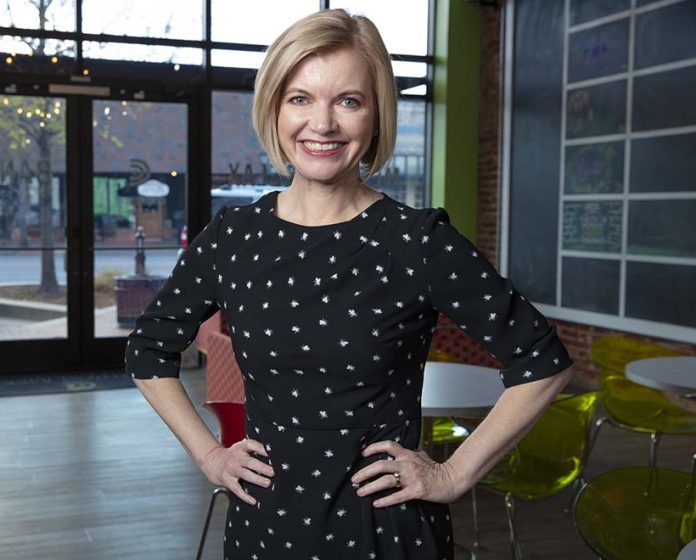
Jill Castilla
President/CEO, Citizens Bank of Edmond;
chair, Citizens Bancshares
As a veteran of the U.S. Army and Oklahoma National Guard who, over the years, has held multiple positions in finance, Jill Castilla knows firsthand about the challenges of being a woman in male-dominated fields.
“Less than 2 percent of the C-Suite in banking is comprised of women and, until the last few years, I was viewed as a novelty and often underestimated,” she says. “The occasional snide comments or condescending tone only fueled my hard work and study. Looking back, my professional journey would not have been nearly as enriching nor as successful without the obstacles of the past. I strongly believe that the valleys in your life are where you are equipped with the character and empathy to be able to handle the peaks with integrity and authenticity.”
As president and CEO of the bank, Castilla finds ways to empower female colleagues and small businesses throughout the state. She recently filed a patent for a new banking technology that was custom designed by her female management team. She also helped spearhead Vault 405, a small-business incubator that hosts workshops on lending, new business banking and social media marketing.
“By engaging with the startup community and viewing ourselves as a 118-year-old startup, I’m focused on fostering that same entrepreneurial spirit throughout Oklahoma,” Castilla says.
Castilla has been nationally recognized for her financial expertise, gaining spots on American Banker’s Most Powerful Women in Banking/Women to Watch list and being named the publication’s Community Banker of the Year in 2015.
3. A Leader for the People
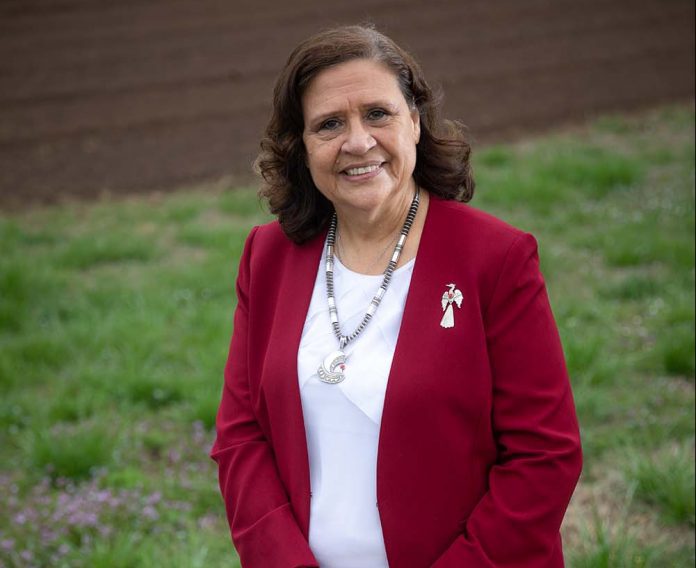
Kay Rhoads
Principal chief, Sac and Fox Nation
Kay Rhoads has a laser focus on the 3,000-member tribe’s business assets in casinos and smoke shops, its access to health care and education. She builds upon the tribe’s strengths, emphasizes job creation and continues diversification of the tribe’s economic base.
Past victories for Rhoads include a U.S. Supreme Court case making the tribe the first in the country to tax its members for automobile tags. Current advocacy includes co-chairing a committee with the U.S. Department of Transportation to establish an office of tribal self-governance. She was recently inducted into the Oklahoma Hall of Fame. Next year, Rhodes will renegotiate casino and smoke shop compacts with the state of Oklahoma.
Rhoads says she wants “our younger people to see a woman lead in various areas … to make real changes in government structure. We as a people can educate on the contributions … of our tribe and of all the tribes in the U.S.
“The Sac and Fox Nation leads and impacts central Oklahoma. Serving the Nation extends to all of Lincoln County and surrounding counties, and we’re looking to expand health-care services, including a new clinic that will be open to everyone. Right now, there is only one clinic in our region and it’s open only to natives.”
Positive changes in the tribe eventually eroded early cultural bias against female leadership, Rhodes says. Running for a third term, she is among a rising number of female chiefs, with peers in Oklahoma, Massachusetts, Connecticut and Montana.
2. Advocating for Marginalized People
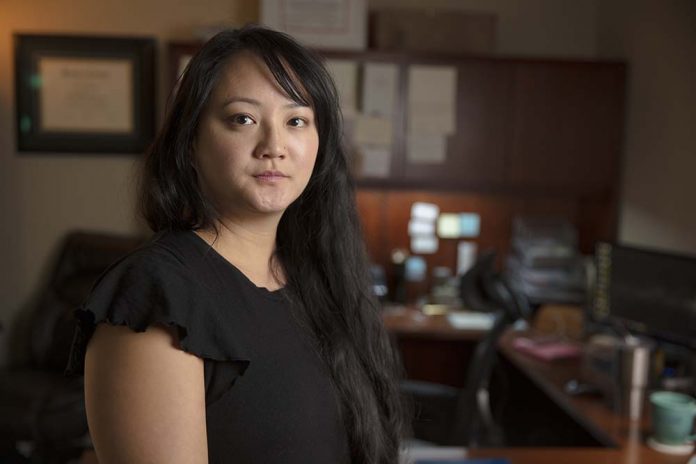
Veronica Laizure
Civil-rights director, Council on
American-Islamic Relations, Oklahoma Chapter
Veronica Laizure says she’s been inspired throughout her life by educators who fostered curiosity and empathy. In law school, she focused on curriculum that enhanced her understanding of entrenched powers and how those structures help or hinder human rights.
Her initial position as a staff attorney at the Council on American-Islamic Relations, Oklahoma Chapter (known as CAIR-OK) was a dream come true.
“I was so excited to have a chance to do this work here in my home state,” Laizure says, “educating people about a religious minority, empowering folks to protect their own civil rights, and fighting discrimination and bigotry where it occurs.”
One of her first initiatives at the council was organizing a full civil-rights department that addressed religious discrimination and harassment of Oklahoma Muslims and provided outreach, education and resources for the Muslim community. Her department releases an annual civil-rights report outlining what her office has done and focuses on improving relations between the Muslim community and the government through initiatives like Muslim Day at the Capitol.
“I love that my position has allowed me to show that women as leaders can be effective, confident and strong in tackling our communities’ big issues, and that we also need compassion and kindness to build our community up,” Laizure says.
She says many women, particularly those of color in male-dominated fields, may face what is called impostor syndrome. One potential solution is support.
“It’s incredibly important for women lawyers, particularly women of color and those who experience intersectional forms of marginalization, to build strong networks in their profession and focus on our own physical and emotional growth as we work,” Laizure says. “It strengthens the practice of law as a whole when all of us are fully empowered to make strong contributions to our evolving legal practices.”
1. A Champion for Women’s Health
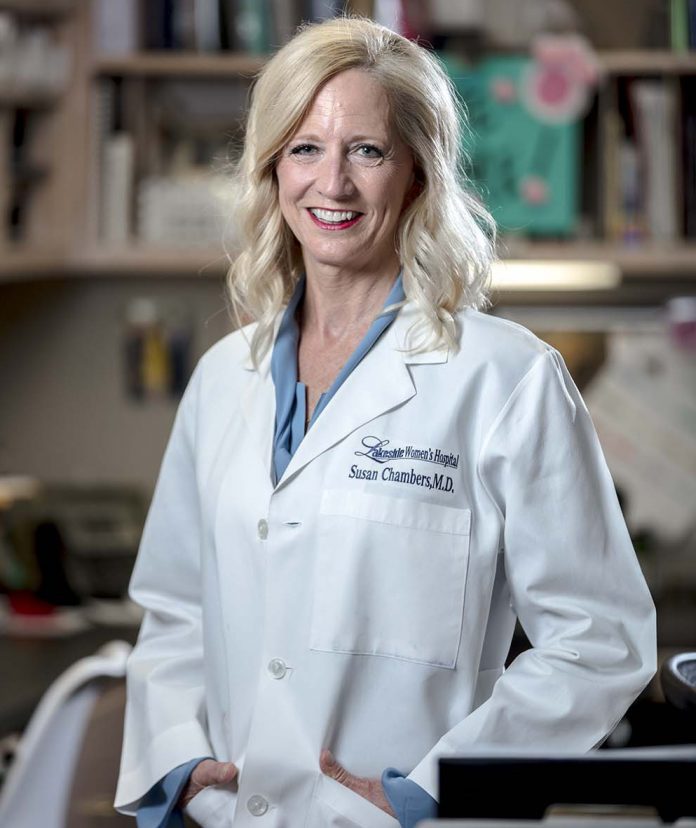
Susan Chambers
Co-founder, Lakeside Women’s Hospital
When Susan Chambers graduated with her pre-med degree from Southern Methodist University in 1978, she was one of only two women in the program. Less than 10 years later, she and two other female OB-GYNs (out of only five in Oklahoma City) opened OKC Gynecology and Obstetrics.
She remembers men’s curiosity about the endeavor.
“I distinctly remember male physicians telling me an office full of women would never work,” she says.
Yet, in 1997, Chambers and her partners opened Lakeside Women’s Hospital in Oklahoma City; 32 years after their initial venture, they continue to have one of the most successful practices in metropolitan OKC.
“I think the way we have developed our office and hospital is a positive impact on the health of women in OKC, but there are still many more things to do and we constantly strive to create new programs,” Chambers says.
Her volunteer efforts are not limited to Oklahoma. For years, she has traveled with the World Neighbors program. In addition, she has served as a host and worked with Afghan and Rwandan women through Peace Through Business, and has been involved with the March of Dimes, Red Cross, local arts organizations, the OKC National Memorial board and other philanthropies. In 2018, she was inducted into the Oklahoma Women’s Hall of Fame.






















